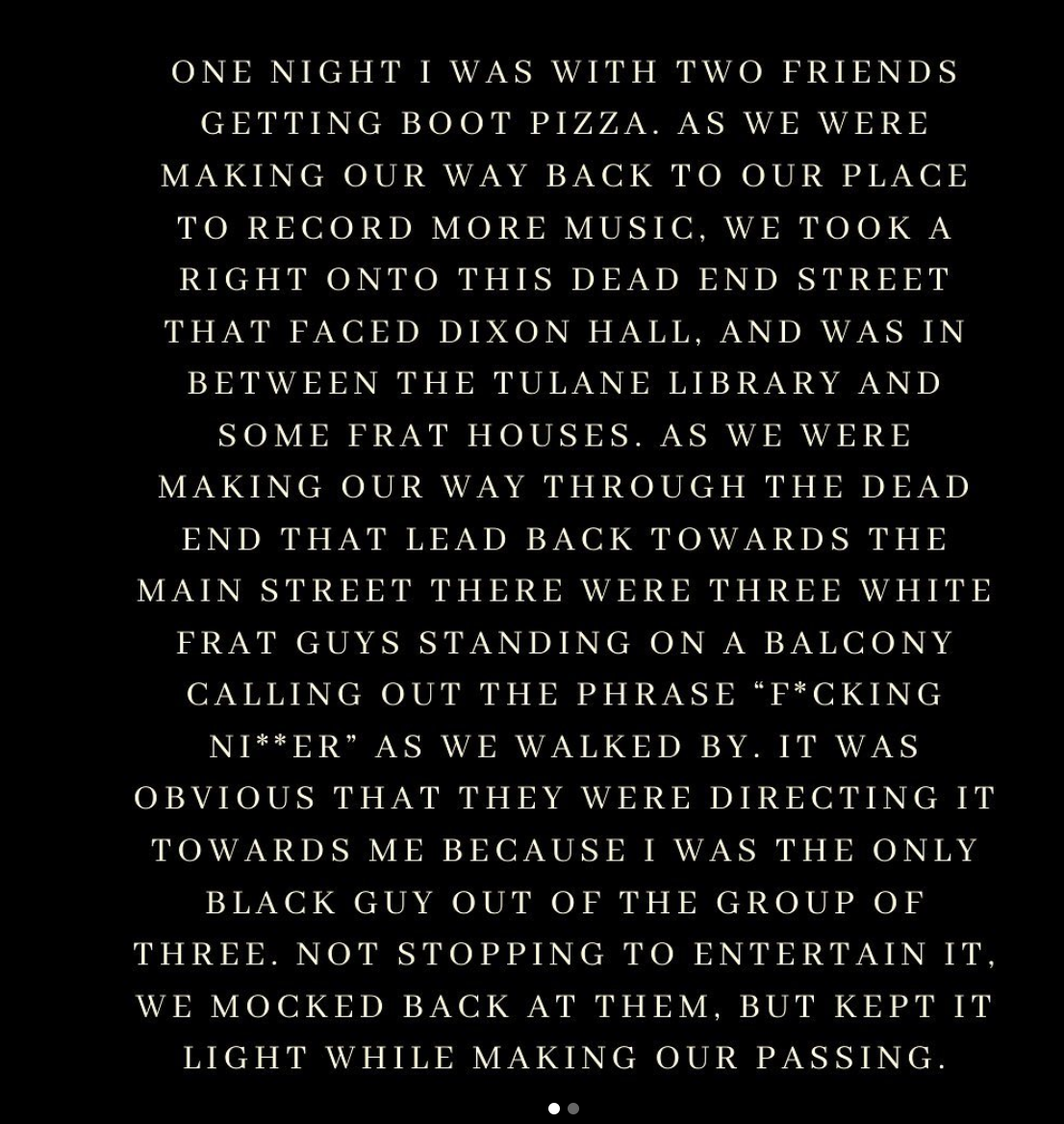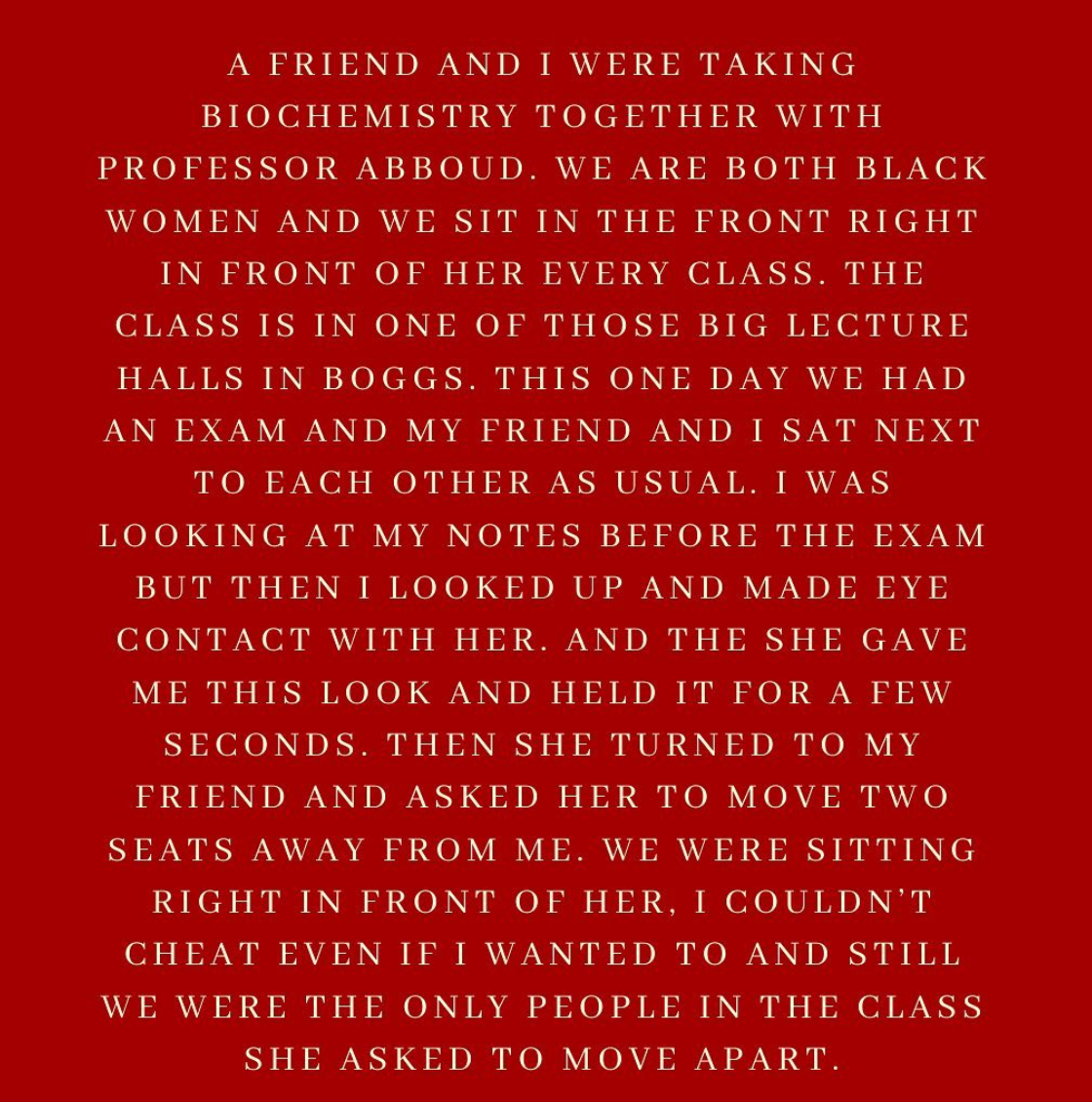
Text Post (Photo from: Instagram @blackattu)
In a city that is 59.7% Black or African American, it should come as a surprise, or not, that Tulane is 70.9% white. Tulane, for many years, has made claims that they want to honor and advance diversity. Tulane regularly collaborates with Tulane offices, such as The Center for Academic Equity and the Office of Multicultural affairs. These offices give current students resources, such as mentoring and funding. The fact still stands that Tulane lacks racial diversity, with 70% of students being white, 8.5% being Black or African American, and even smaller percentages of other ethnic and racial groups. Additionally, there have been multiple accounts, for example, from the Instagram account @blackattu, of African American students feeling unwelcome or experiencing blatant racism on and off-campus.
In June of 2020, Tulane released a new plan for racial equity. This letter from the university’s president, Mike Fitz, promised a broader racial equity education program, increased support and funding for students in marginalized groups, community discussion, a health equity institute, and increased staff diversity. While this is a lengthy plan, it does not account for the simple lack of diversity in the current and likely future student bodies. Frequently, there is zero to one Black student in a particular class at Tulane. Tulane does not account for how to increase diversity. Perhaps, this plan will attract more Black students to apply, but this is not guaranteed. It is also important to note that this is not merely a problem with Tulane. Schools across the country face issues with gaining racial diversity within their classes. Many factors lead to this lack of diversity, including underfunded public schools. Research has shown that in schools that are largely students of color and poor, the schools receive roughly 1,600 dollars less per student. This is just one of the hundreds of factors that lead to Universities that are not racially diverse.
Tulane’s full tuition and other fees come out to over seventy thousand dollars; therefore, Tulane is a high-priced private school. To compare its price to a public school, LSU for an in-state student costs roughly twenty-four thousand dollars. Additionally, a clear and sizeable white-black wealth gap shows that the average white family has a net worth of roughly ten times the net worth of a Black family. In New Orleans, these income trends are similar. The median parent income of students at Tulane is 180,000. While the school is known for merit aid, this seldom covers full expenses.

Text Post (Photo From: Instagram @blackattu)
The Instagram account, @blackattu, recognizes the different experiences that African American students may experience at Tulane and has, therefore, highlighted dozens of anonymous racism charges in Tulane’s student body. The reports range from harassment from white students to Black students involving hate speech and times when Black students felt uncomfortable within the classroom due to either the professor or other students. Tulane has not publicly acknowledged any of these cases. The response to this Instagram account has been immense. On countless posts, dozens of students tag the Tulane Instagram account or various Tulane committees to bring awareness to the incidents. Another student commented directly on the Instagram, “I hope it is clear that these accounts of student experiences are not just isolated events. Y’all have the direct power to invest in the quality of education and livelihood that BIPOC receive.” This student makes a statement regarding how Tulane could directly improve the educational experience for marginalized students.
Other incidents that this Instagram account highlights are further microaggressions faced by Black students. For example, one African American student was the only student asked to move during a test when she clearly was not cheating and sitting in the front row. Another is a remark about a white student laughing when she heard there is a Black student union on campus and their corresponding meetings. On one post, a student comments, “Regularly experiencing these microaggressions will take its toll on you. Please take care of yourselves.” This Instagram page shows that many Black and marginalized students feel the effects of microaggressions regularly. This Instagram account has 4,803 followers. There are still thousands more Tulane students who may not be aware of the racism on campus. Does the university need to do more to educate all students? Is the university perpetuating white fragility by not acknowledging racism at Tulane?
 NOLAbeings
Multimedia artist Claire Bangser created NOLAbeings as a portrait-based story project that marries...
NOLAbeings
Multimedia artist Claire Bangser created NOLAbeings as a portrait-based story project that marries...
 Data corner: Adobe Suite (create a PDF, social media graphic, presentation, edit a photo and video
Data corner is where you go to work with analytics and top tech skills. It takes on everything from PERL and SQL to Canva and Sprout Social.
Data corner: Adobe Suite (create a PDF, social media graphic, presentation, edit a photo and video
Data corner is where you go to work with analytics and top tech skills. It takes on everything from PERL and SQL to Canva and Sprout Social.
